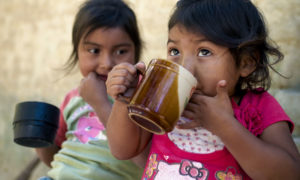At the same time, rapid urbanization is leading to higher consumption of processed foods high in sugar, salt and fat, and lower levels of physical activity: approximately 51 percent of women in Honduras are overweight or obese (2012). Non-communicable chronic diseases (NCDs) such as cardiovascular diseases, diabetes, hypertension and cancer, are now among the top ten causes of mortality in Honduras. Therefore, promoting healthy diets are part of the strategy of PyENSAN2030, contributing to the goals of Agenda 2030 for Sustainable Development in the country.
UNRC call for a multi-dimensional approach
Increased efforts to ensure a multidimensional approach to nutrition, as well as strengthening the nexus between humanitarian and development interventions, are being supported under the leadership of the newly-appointed UN Resident Coordinator (UNRC), Alice Shackelford, and the Resident Coordination Office
“This is critical in a country such as Honduras where structural nutrition issues are coupled with over 60 percent poverty, 75 percent informality [in the job market] and a lack of social security measures and protection mechanisms,” says Alice.
“We need to keep a medium/long-term approach and integrate these efforts in the strategy for eradication of extreme poverty and reduction of inequality critical to the 2030 Agenda [Sustainable Development Goals] and leaving no one behind. And this directly links to capacity of the population to actively engage and strengthen democracy and rule of law. The UN has to be up to the task and be able to work as a system and not any more as individual agencies and mandates.”
Network membership
The UN Network (UNN) is one of the new SUN networks to be established in Honduras, along with the Civil Society Network and the Academic Network. David Nataren confirms that it has been easier in the early stages to bring on board the agencies that have more obvious synergies, such as WFP, the Food and Agriculture Organization of the United Nations (FAO), the Pan-American Health Organization (PAHO/WHO), the United Nations Children’s Fund (UNICEF) and the United Nations Population Fund (UNFPA), and that the organizations are already working together on joint proposals. The UNN has also had exploratory discussions with the World Bank and UNDP to see how each agency fits in with the Food and Nutrition Security Plan, as it recognizes that this is definitely the way forward and not the work for just one agency.
United Nations’ agencies were invited to join the Network at the UN Country Team meeting in September 2019, which was attended by eight agencies. An understanding of the multi-sectoral approach to nutrition is described by United Nations stakeholders as in its early stages in Honduras. It is a particular priority for the UNN to make sure the World Bank is included in the network. “We need WB’s technical expertise and investment if we’re to have a holistic approach as advocated by the SUN Movement,” says David.
Nutrition data gaps

SUN Movement Coordinator meeting with the National Council on Food and Nutrition Security in Tegucigalpa (Honduras)
A top priority for United Nations agencies is to collect key data in order to put nutrition within the framework of public policies and with all actors working across different sectors. This lack of data capacity was highlighted during Gerda Verburg’s [UN-Assistant Secretary General & Coordinator of the SUN Movement] country visit last year.
“We need to have a faster and easier reading of the nutrition situation in the country, using evidence that has been built jointly at the country level,” confirms David. “At the moment the Government has to turn to the UN for a specific study – there will be more efficiencies if we work together to build capacity. When we have the numbers, it will also enable us to talk to the private sector about investing in good nutrition.”
According to Jose Ramirez Arita, Early Childhood Development Officer with UNICEF Honduras, COVID-19 has shown the government that it is possible to handle information virtually. “I believe that the Network should support the government in information management. Our country still does not have a digital online system that can show the number of children affected by malnutrition, anaemia, etc. This information is only known from surveys, which are not very frequent.”
